- Home
- L. M. Montgomery
A Name for Herself Page 18
A Name for Herself Read online
Page 18
So Polly allowed herself to be cheered up.
The foregoing reminds me of an anecdote of Sam Jones I read somewhere recently.183 The noted evangelist was once taking women to task for spending more time in prinking than praying.184
“If there is one woman in this audience,” he said finally, “who prays more than she prinks, let her stand up.”
One poor faded specimen of femininity, in the sorriest, shabbiest of clothes, arose.
The preacher looked at her.
“You spend more time praying than prinking?” he asked her.
She said she did – that she prayed a great deal and never prinked at all.
“Madam,” said Sam Jones, solemnly, “you go right straight home and put half your praying time on your prinking.”
[Double Standards]
Monday, 17 February 1902
ST. VALENTINE’S DAY HAS COME AND GONE. Did you get any valentines? Polly got a comic one and she is furious. It was a broad slap at her flirtation tendencies and that is what vexes her. Nothing on earth can convince Polly that she ever flirts – even the least wee bit, you know. It seems to be inherent in human nature that we should be blindest to the very faults in ourselves that are most patent to other people. This must be why the cap of a comic valentine never seems to fit the recipient’s head.185 We have lots of other faults, of course, but this particular one, not at all.
We have started an anti-slang society around the table. Every time one of us catches herself or himself using a slang word or expression he or she has straightway to deposit a cent in a bank which Ted has purchased for the purpose and placed on the sitting room mantel.
At first we thought we would make the fine five cents. But Polly protested. She said her allowance was only so much per quarter and a five cent fine would bankrupt her in a week, so we put it at one cent. The money is to go towards Miss Stone’s ransom.186
Ever since the heap of pennies in the bank has been increasing steadily. We never realized how strong a hold the slang habit had on us until we tried to break it. If you had asked me I would have said that I used very few slang words in my daily walk and conversation, and such would have been my honest belief. But I must candidly admit that my pennies have disappeared most rapidly and unaccountably since the institution of our anti-slang society.
We have had no end of fights over it. We can’t always agree on what is slang and what isn’t. Polly and Ted argue some disputed question every day and get excited and sarcastic over it. Aunt Janet sighs patiently and says that for her part she wouldn’t mind our slang half as much as our quarrels. She thinks our organization should be called an anti-peace society.
Theodosia thinks we ought to make a distinction between slang that is “vulgar” and slang that isn’t.
“You can’t deny,” she says, “that some slang expressions are rather ‘cute’ and hit off” – here Ted interposed with “a penny, if you please, Theo.” Theo paid the penny and returned to her mutton187 – “one’s meaning much more aptly than if expressed in classical English. When you say that a person is ‘talking through his hat’ you express in a sentence what it would take a whole paragraph to elaborate. ‘Not in it’ is useful at a pinch and I could enumerate many more that are very pat. What’s that, Ted – another cent? You mean wretch! Well, I’m not the only peb– I mean, there are oth– no, I don’t. I’m not going to say another word today or I shall be dead broke.”
And amid peals of laughter Theodosia put four cents into the ransom fund.
But there is something in Theodosia’s argument after all. Some slang words and phrases are undeniably rather expressive and piquant. In due time they will be admitted to the good society of English undefiled and their lack of ancestry will be forgotten and forgiven. On the other hand, the use of slang is a habit that grows upon one to an alarming extent and as everyone has not the power to discriminate between “vulgar” and non-vulgar slang it is perhaps best not to indulge in it at all – except, of course, under provocation.
It has been the custom from immemorial ages for men to accuse women of killing other women’s chances of social success by “faint phrase”188 – that most effective weapon of warfare in skilful hands.
Well, perhaps we do, we must have some weapon of offence and defence. But what I want to know is this – isn’t our delicate, unobtrusive way of doing it better than the brutal, outspoken criticism some men – to be just, not all. Oh, there are a few blessed exceptions, and any man who chances to read this will fondly number himself among them – inflict on their sisters, cousins and aunts. Even Ted comes out quite strong at times. When he heard of Gwennie’s engagement the other evening he remarked, gently:
“So she’s given up at last, has she. I know she never accepted Jim until all hope of getting anybody else had gone.”
If Polly or Theodosia or I had said this Ted would never cease commenting caustically on our feminine spite and pique; but of course it was all right when a masculine creature said it.
I heard an acquaintance of mine say recently that a woman who wore one of the present fashionable long loose coats did so to conceal her bad figure; and another followed it up by saying that a certain girl he knew “was trying to hide her wrinkles.” As the girl in question is only about twenty one would suppose she could not have many wrinkles to hide. But this charitable man chose to believe and state his belief that her rosy complexion was taken off and put on at will.
Now, if the men want to say these things, let them. I am not trying to curtail their privileges at all. What I do protest against is the injustice of their sneering at women for saying the same things. If it is just feminine spite and pique in women what, in the name of common sense, is it to be called in men? Never let the men worry themselves about our voting. Let them simply be just to us in this particular and they can run politics all by themselves.
Oh, no, indeed, gossip is not feminine gender. Don’t think it for a moment.
I hope the girls at the Halifax “Central” are not as hard driven as the telephone girl in this story.
A nervous looking girl consulted a doctor, who asked her what she was suffering from. She said:
“I’m a telephone girl, doctor, and the work is a terrible strain on my nerves. The monotony of having a receiver constantly at my ears and saying ‘Hello’ tells upon them. When I’m off duty ‘Hello’ is always ringing in my ears and I am constantly saying it. When I wake up in the morning I say ‘Hello.’ And even when I kneel down to say my prayers I instinctively say ‘Hello’ before I commence them.”
[Tall Tales and Close Calls]
Monday, 24 February 1902
HOW OFTEN DID YOU FALL ON A SLIPPERY STREET THIS winter?
I have seen some very comical tumbles of late. It’s one of the funniest sights in the world to see somebody who is strutting along in front of you slip, gyrate wildly for a minute and then go neatly down. I never can help laughing when I see it.
It’s so funny to see other people fall down. It isn’t a bit funny when I fall myself. I don’t know why but it isn’t.
Did you ever know of people hurting themselves when they fall on the street? They never do because they always say, “Oh, no, I didn’t hurt myself at all,” and of course they are to be believed. They certainly ought to know.
A man of my acquaintance says that Theodosia is the most extraordinary girl he ever met. He was walking down Prince street with her the other day, and she suddenly slipped and fell. He picked her up and asked her if she had hurt herself. She frankly admitted that she had. He says he hasn’t recovered from the shock of surprise yet.
The people who know everything – and, oh, there are so many of them – say that the age of fairy tales is past – that the children of nowadays don’t like them and won’t read them.
I don’t believe that is true; and I don’t believe that it is only children who like fairy tales. I’ve been grown-up for some time and I revel in fairy-tales still.
I wonder if the same old stories
are told in child-land still that were current when I sojourned in that magical country. If not I’m sorry for the children who miss hearing those old classics. There was a never-fading charm and interest about them. And they stood telling so well, too. The hundredth time of relation they were just as fresh and unhackneyed and thrilling as the first. Mother always told them to us at twilight. We listened breathlessly and woe betide her if she left out any part or made any alteration. We would not tolerate this for a moment.
“No,” we would say, “you’ve forgotten to tell us how the wolf just glared at Little Red Riding Hood and said: ‘They are to eat you with.’ And then he gobbled her right down,” we would add with a thrill of delicious horror.189
Red Riding Hood was our favorite story because of its horrors and tragical end. There was a big spruce wood behind our house and we always thought that was the wood she went through in her little scarlet hood and cloak. She and her grandmother and that beautiful wolf were real folk to us.
A story that ran Red Riding Hood hard in popularity was that of the little boy and the three brown bears who lived in a little brown house in a wood.190 The little boy went there one day, found the bears out, ate up all their porridge and played a good many more tricks on the poor bears. Then he got into the little bear’s bed and went to sleep. The bears came home and found him there. (How we shivered with delight at this point!) They were going to eat him up. I forget just how he managed it but I know he succeeded in nailing the bears to their chairs by their tails and so made his escape. It was a continual source of speculation among us how the bears freed themselves or if they ever did.
Then there was the story about the old woman and her pig who wouldn’t go and the stick that wouldn’t beat it and the grease that wouldn’t grease the stick and so on.191 And Jack and the Beanstalk, of course, with its weird “fee fo fum, I smell the blood of an Englishman,” and Bluebeard and Cinderella and the Sleeping Beauty, and Puss in Boots.192 Oh, why don’t people write stories like that nowadays!
Did you ever get on a street car and then discover that you hadn’t any money with you to pay your fare?193
I did the other night. And I know now just how a condemned criminal feels.
I had a five cent piece with me when I got on the car. I thought it was in the left pocket of my coat. When I got settled comfortably down I felt for it. It wasn’t there. I had a cold chill. I felt in the other pocket. Not there. I had another chill. Then I felt in a little inside pocket. All in vain. I had two chills at once.
I took off my gloves, laid them on the seat and went over all my pockets again. It was not there. I stood up and shook myself and then looked on the floor. The car was full of people, who were going home from the Academy of Music and they all stared at me, but I was past caring for a little thing like that.
But I could not find my fare. I concluded that I must have put it in my mouth and swallowed it inadvertently.
I didn’t know what to do. Would the conductor, I wondered, stop the car and put me off in ignominy and shame? Was it possible that I could convince him that I was merely the victim of my own absent-mindedness and not an unprincipled creature trying to obtain a ride under false pretences. I was so glad I had on my Sunday-go-to-meeting clothes. I thought the conductor would be more likely to believe that I had once possessed a five-cent piece, although I no longer had it, than if I had had on only my second best. I tried to frame some sentences of explanation in my mind, but I forgot the first part while I was thinking out the last and anyway I knew when it came to the critical moment I would blush and stammer and look as if nobody had ever trusted me with a red cent in my life. I felt that there was nothing to do but trust to Providence. And for all the comfort that gave me I might as well have been the lady who, when told by the captain during a storm at sea that she must put her trust in the Almighty, exclaimed: “Oh, captain, is it as bad as that?”194
Just at the conventional moment when all hope had fled and the conductor was before me holding out his box I suddenly remembered where I had put that wretched coin of the realm. I had not swallowed it after all.
I meekly fished it out of the index finger of my glove and poked it in the box. I smiled at everybody and felt that it was a beautiful world.
From a perusal of the “funny” papers wouldn’t you think
That nobody ever paid his debts.
That women spend all their time saying uncharitable things about each other and
That men spend all theirs trying to borrow a five from each other.
That every old maid in the world does nothing but lay snares for every single man she knows, and
That all the married people wish they were single again.
That there never was a widow whose husband hadn’t a happy release.
That there never was a nice mother-in-law.
That there is something funny in a man’s coming home at night dead drunk.
That the church deacons always gamble at races.
That a woman can’t pass a milliner’s window without stopping to look in.
That no young wife could ever cook anything fit to eat. That all people in love make fools of themselves.
That all spring poets starve.
That a woman never tells her real age.
But what a comfort it is to reflect that there are quite a few decent people in the world for all, despite the funny papers.
[Graves of the Past]
Monday, 3 March 1902
FEBRUARY HAS TO HAVE A THAW. “OLD INHABITANTS” will tell you that “Febooary” never goes out without a thaw. On some rare occasions they have known it to almost do so, but the thaw would begin at five minutes to twelve on the night of the 28th and so save the tradition. Well, there was no such close shave this year. February redeemed its reputation triumphantly before its departure.
Ted is one of those unlucky – or lucky, just as you choose to regard it – individuals who were born on the 29th of February. Consequently he has been cheated out of his proper share of birthdays and it is a sore point with him. Just now, of course he is worse off than ever, because eight years must elapse between his last birthday and his next.195
That pouring rainy night last week Polly and Ted and Aunt Janet went to the Academy of Music and Theodosia and I found ourselves spending the evening alone. I was curled up snugly in the cosy corner, nibbling some chocolate caramels and gazing dreamily – dreamily is the proper word, isn’t it – into the glowing coal fire, which was snapping and spluttering away to itself in the nice companionable way such fires have; presently Theodosia came in and curled herself up on the big bear rug before the fire – a real silver tip,196 by the way, that Ted shot when he was out in British Columbia last winter. The silver tip nearly ate our Teddy up, too, and – but where was I at?
Oh yes! Theodosia came in and sat down on the coat of the defunct silver tip with a queer little old box on her lap. You know the kind. Most of us have one of the same species stowed away somewhere full of curious old trash that all the gold of Ophir couldn’t buy from us.197 Not that anybody would offer it. The contents of such boxes are worthless to all except the owners.
The boxes may differ externally, but they have a faded, cherished air, as of a box that has seen better days. Theodosia’s is of polished wood and has a checker board inlaid on the cover. It is locked by a curious little silver key with a dragon’s head for a handle. Theo turned the key solemnly, with the air of one who is opening a grave of the past. There was a dreamy smile on her face.
“Poor Dick! He gave me this box years ago when we were children together, for a birthday present. I’ve always kept my treasures in it. I wonder where Dick is now. He married some girl in St. John and went to the States.”
Theodosia shook her head sadly. Evidently she thought Dick’s fate a gloomy one. I looked on with interest. I love old boxes and Theodosia’s looked interesting. I had never seen her treasures before and I was sure there was a round dozen of romances locked up in that little inlaid box.
The first thing Theodosia fished out was a queer little gold ring, of the kind that used to be known as a “friendship ring” – two hands clasping each other. It was somewhat bent and battered and had, it must be confessed, a rather brassy appearance.
“My first sweetheart gave me this,” said Theodosia, as she slipped it on sentimentally. “We were both ten years old. He earned the money for it picking berries for a cross old woman who lived near us. He was such a dear little chap, with big blue eyes and yellow curls and freckles. There ought to be a letter from him somewhere here, too. Ah, here it is,” – picking up a little square pink envelope from which she extracted a sheet of pink paper scrawled over in a very big boyish hand – “he slipped this into my spelling book one day and I thought I had never read anything so delightful. I think so still. What’s that, Cynthia? Let you read it? No, indeed. How badly spelled it is! And how ungrammatical! Strange I never noticed those faults at the time.”
“Here’s a photo of my graduating class. Twelve girls of us all in new dresses. How very prim we look. What a dumpling I was then. Dear me! three of those girls are dead, four are married and the rest are scattered far and wide. It makes me blue to look at it!
“Here’s a picture of myself when I was a baby. Do you think I ever looked like that, Cynthia? Well, I was a pretty baby anyhow. Aunt Debby always tells me that,” and then remarks with a sigh, “Strange how people do change when they grow up. Look at my mouth – wide open as if I were going to bawl. Cynthia, you may count yourself happy. You haven’t any picture of yourself when a baby to darken your maturer days.”
“These,” continued Theodosia, picking up a chubby bundle of pale blue envelopes tied together with pink ribbon, “are not, as you might imagine, billet-doux.198 They are the letters written to me by my school chum at the most sentimental stage of our careers. They are full of vows of eternal friendship and protestations of undying affection. We never speak as we pass by now. I wonder if she has my old letters still. They were written on pale pink paper. I think I must burn these.

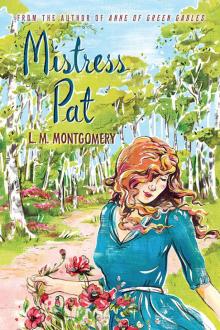 Mistress Pat
Mistress Pat A Tangled Web
A Tangled Web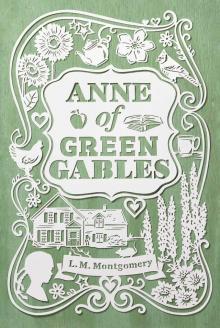 Anne of Green Gables
Anne of Green Gables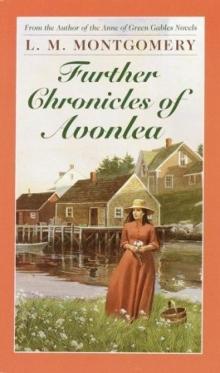 Further Chronicles of Avonlea
Further Chronicles of Avonlea Magic for Marigold
Magic for Marigold Pat of Silver Bush
Pat of Silver Bush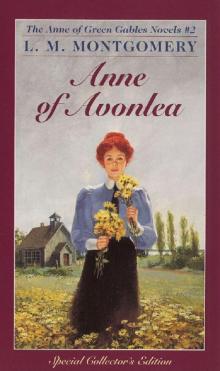 Anne of Avonlea
Anne of Avonlea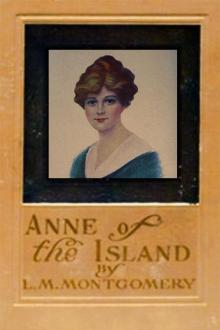 Anne of the Island
Anne of the Island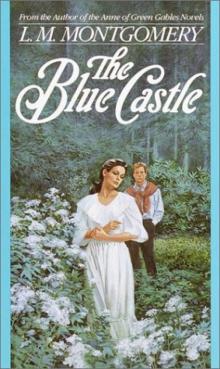 The Blue Castle
The Blue Castle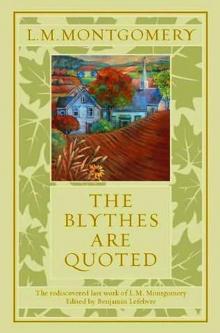 The Blythes Are Quoted
The Blythes Are Quoted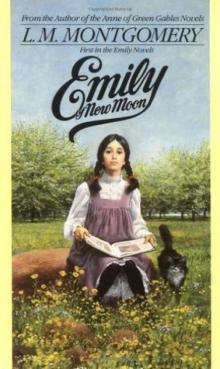 Emily of New Moon
Emily of New Moon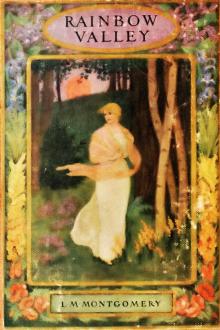 Rainbow Valley
Rainbow Valley Rilla of Ingleside
Rilla of Ingleside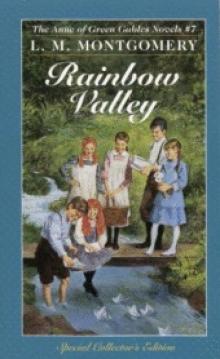 07 - Rainbow Valley
07 - Rainbow Valley Anne of Green Gables (Penguin)
Anne of Green Gables (Penguin) Emily Climbs
Emily Climbs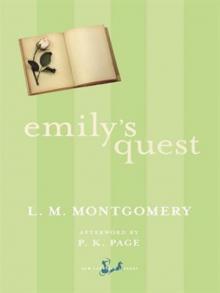 Emily's Quest
Emily's Quest A Name for Herself
A Name for Herself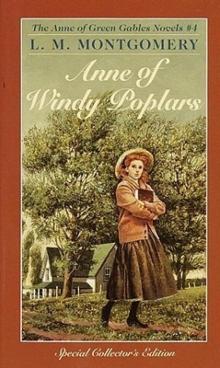 Anne of Windy Poplars
Anne of Windy Poplars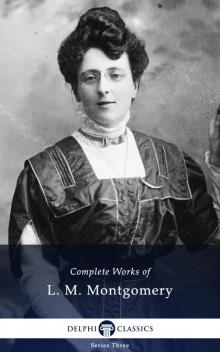 The Complete Works of L M Montgomery
The Complete Works of L M Montgomery The Story Girl
The Story Girl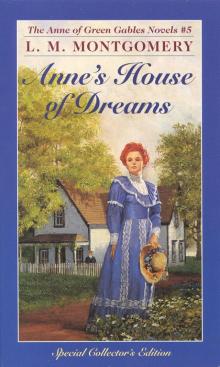 Anne's House of Dreams
Anne's House of Dreams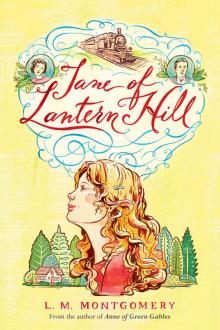 Jane of Lantern Hill
Jane of Lantern Hill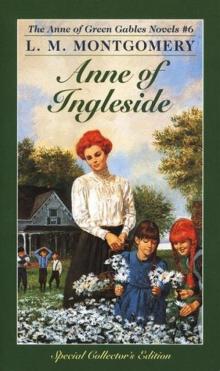 Anne of Ingleside
Anne of Ingleside